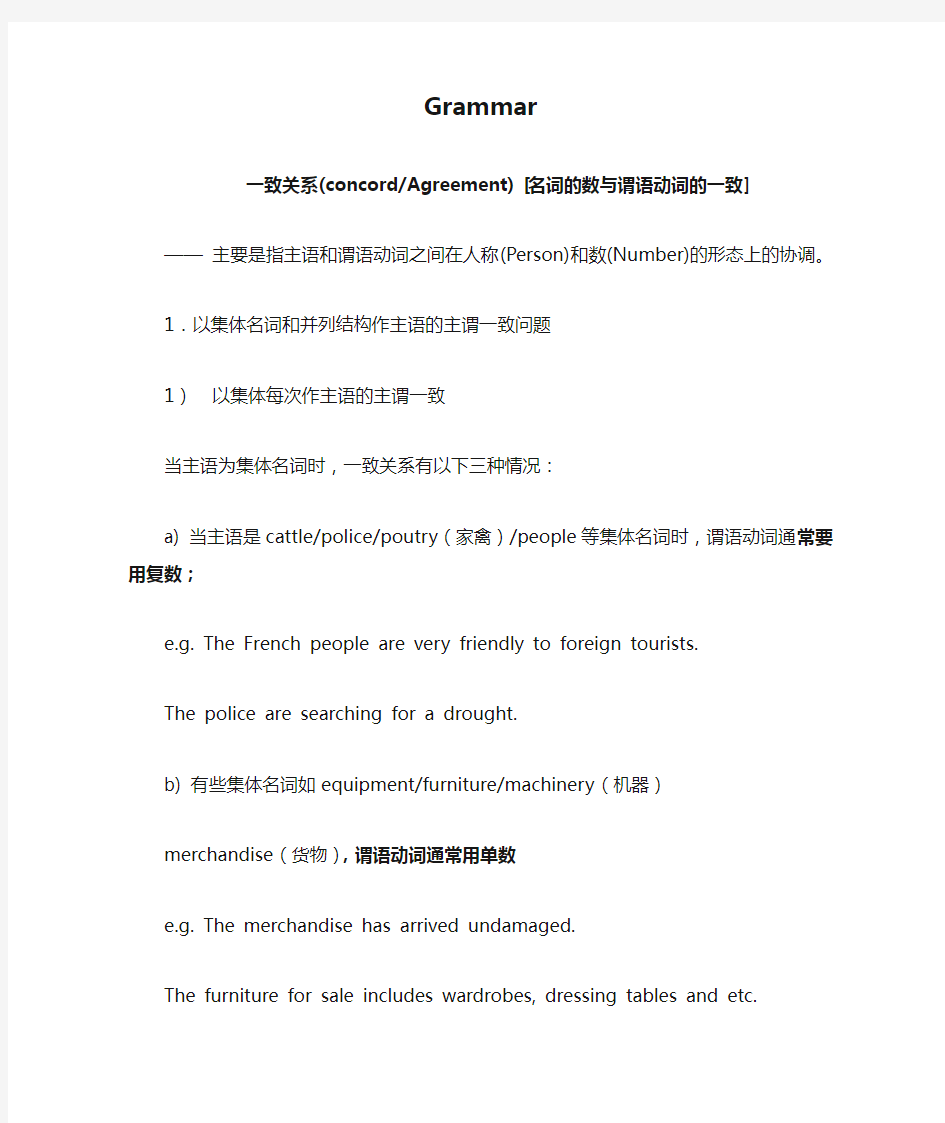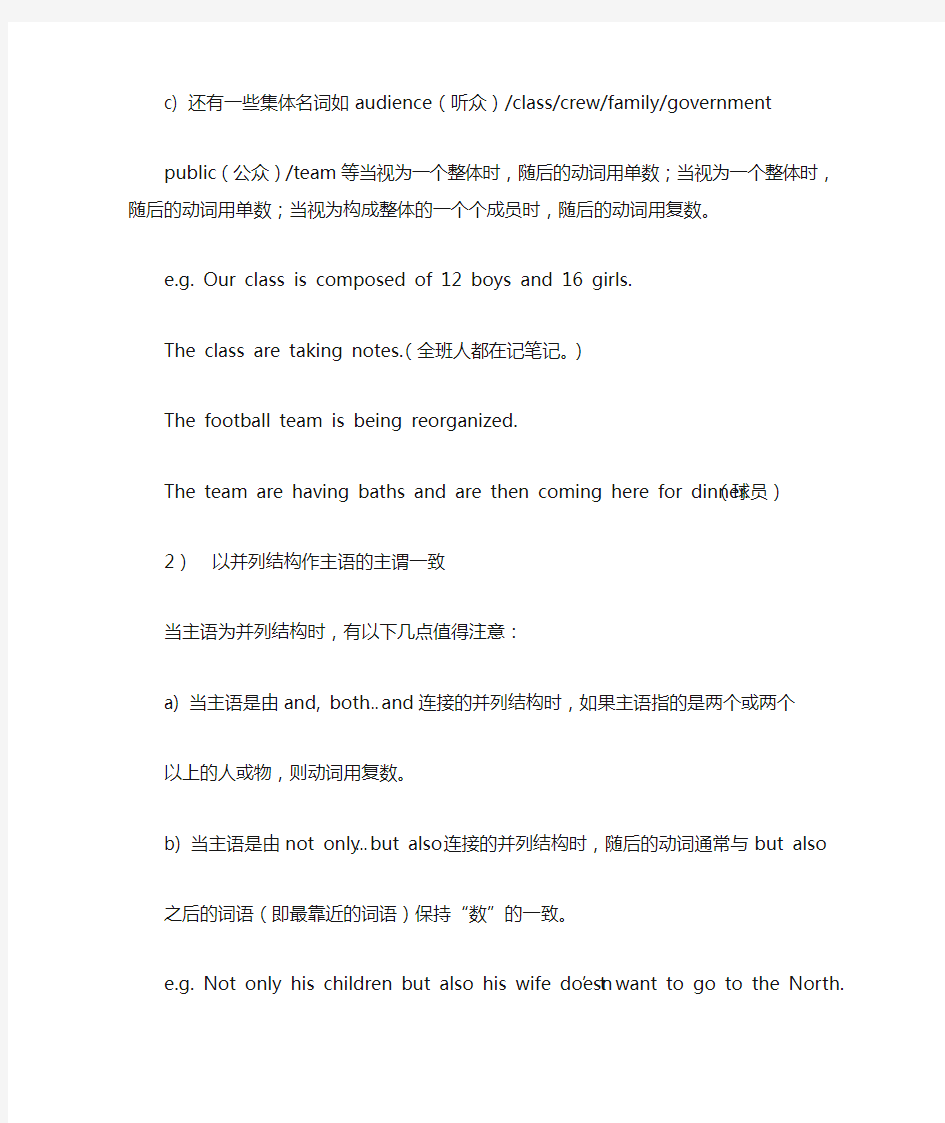Grammar名词的数与谓语动词的一致


Grammar
一致关系(concord/Agreement) [名词的数与谓语动词的一致] ——主要是指主语和谓语动词之间在人称(Person)和数(Number)的形态上的协
调。
1.以集体名词和并列结构作主语的主谓一致问题
1)以集体每次作主语的主谓一致
当主语为集体名词时,一致关系有以下三种情况:
a) 当主语是cattle/police/poutry(家禽)/people等集体名词时,谓语动词通
常要用复数;
e.g. The French people are very friendly to foreign tourists.
The police are searching for a drought.
b) 有些集体名词如equipment/furniture/machinery(机器)
merchandise(货物),谓语动词通常用单数
e.g. The merchandise has arrived undamaged.
The furniture for sale includes wardrobes, dressing tables and etc.
c) 还有一些集体名词如audience(听众)/class/crew/family/government
public(公众)/team等当视为一个整体时,随后的动词用单数;当视为一个整体时,随后的动词用单数;当视为构成整体的一个个成员时,随后的动词用复数。
e.g. Our class is composed of 12 boys and 16 girls.
The class are taking notes. (全班人都在记笔记。)
The football team is being reorganized.
The team are having baths and are then coming here for dinner.(球员)
2)以并列结构作主语的主谓一致
当主语为并列结构时,有以下几点值得注意:
a) 当主语是由and, both…and连接的并列结构时,如果主语指的是两个或两个
以上的人或物,则动词用复数。
b) 当主语是由not only…but also连接的并列结构时,随后的动词通常与but also
之后的词语(即最靠近的词语)保持“数”的一致。
e.g. Not only his children but also his wife doesn’t want to go to the North.
Not only the mother but also the children were sick.
c) 当主语是由or, either…or, neither…nor连接的并列结构时,随后的动词也是与最靠近的词语保持“数”的一致。
e.g. Mr. Blake or her two daughters are accompanying us to the hearing.
Either the ministers or the queen herself is to blame for the defeat.
Neither the players nor the coach was confident of victory.
Neither Mr. Brown nor the other teachers know the author of the book.
2. 以由-s结尾的名词作主语的主谓语一致的问题。
英语中有些名词本身就是以-s结尾的,当这类名词作主语时,随后的动词形
式有以下三种情况;
1)以-s结尾的名词作单数
在下列以-s结尾的名词之后,动词通常用单数
a)以-s结尾的疾病名称
e.g. Mumps was rapidly spreading in that area.
(腮腺炎在那个地区迅速地蔓延。)
还有:arthritis (关节炎),Diabetes(糖尿病)
b)以-s结尾的游戏名称
e.g. Marbles was one of my favorite games.(打弹子以前是我所喜爱地游戏。)
还有:draughts
【但】cards 后必须跟复数地谓语动词
e.g. Cards are not allowed here.
c)以-ics结尾的游戏名称
Mathematics/Statistics/Athletics
2)以-s结尾的的名词作复数
在下列以-s结尾的名词后面,动词常用复数
a)以-s结尾群岛、海峡、山脉等名称
e.g.The west Indies are large group of islands lying between North America and
South America. 西印度洋群岛是介于北美和南美之间的一个大群岛屿。
还有:The Himalayas喜马拉雅山
b)英语中有些由两个部分组成的物体名称如glasses/pincers(钳子)/scissors
Shorts/suspenders(吊带)/shoes/trousers/pants/boots等,通常作复数,动
词用复数
e.g. My new trousers are too loose.
【注意】但若这类名词之前带有a pair of/two pairs of 等单位词,则以单位词的单,复数决定动词的形式。
e.g. A pair of shoes is not enough.
Two pair of shoes are missing.
c)凡是由-ing结尾的名词如earnings/surroundings/sweepings(垃圾),动词
用复数
d)其他的以-s结尾的名词如clothes/contents/goods/stairs等,通常用作复数,
动词用复数。
e.g. His clothes were clean.
The contents of the book are fascinating indeed.
High wages often result in high prices.
3)英语中有些以-s结尾的名词如:means/series(系列)/works(工厂)/headquarters (总部)/species(种类),是单复数同行,随后的动词形式依主语的单、复数意义而定。
e.g. Every possible means has been tried.
All possible means have been tried.
3.其他
1)数量词如果该词表示的数量是一个整体的时候,随后的动词用单数,否则用
复数
e.g. Twenty years in prison was the penalty he had to pay.
The past four weeks have been the hottest in this summer.
2)当主语为many a + 名词,more than one +名词时,主语的意思虽然是复数,但谓语动词用单数。
e.g. Many a man was killed in the accident.
More than one passenger is missing.
Exercises:
确定谓语动词的单、复数形式:
1.In those days, even bread and butter was (be) a luxury to us.
2.Mumps is (be) infections.
3.We were caught in the rain, and our clothes were (be) wet through.
4.Fifteen kilometers is (be) quite a distance to walk.
5.The team are (be) discussing the game among themselves.
6.Either you or I am (be) to be responsible for it.
7.Every means has (have) been tried to solve the problem.
8.There is (be) a desk and several chairs in the room
9.Neither the players nor the coach was (be) to blame for the defeat.
10. The pants are (be) lying on the chair.
